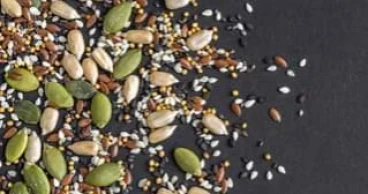Super Food
Top 10 Healthy Seeds to Eat
Nutrition plays significant roles for a human’s overall health and mental well-being. Adding seeds to one’s regular diet have numerous health benefits. Let’s discuss different types of seeds and their respective health benefits.
What Are Seeds?
All flowering plants reproduce through seeds. In simple words, a seed is the tiny, round or oval, hard component of a plant that works as the starting point of a new plant. More scientifically, a seed is a small embryonic ‘plant’, surrounded by a protective layer called the seed coat with certain reserved nutrients. In an appropriate environment, each seed has the potential to develop into a new plant.
How Seeds are Different from Nuts, Grains, and Beans
While many confuse seeds, nuts, grains, and beans; they are all different types of plant-based foods with unique characteristics. Though they share some similarities in terms of their nutritional content, they have differences.
Seeds are the reproductive parts of plants with high protein like chia seeds, sesame seeds. They are rich with healthy fats, fiber, vitamins and minerals.
Read More; Sweet Potato Health Benefits: The Organic Affordable Super Food
Nuts are the fruits of certain trees like almonds, peanuts. They are generally high with healthy fats, protein, fiber and various vitamins and minerals.
Grains are actually the seeds of grasses such as wheat, rice. They are a good source of carbohydrates, fiber, minerals and some essential vitamins.
Beans are the edible seeds of legume plants, such as lentils, kidney beans. Beans are nutritious with protein, fiber, various vitamins and minerals.
Each of these foods has unique properties that make them valuable additions to a healthy and varied diet.
Read More: Best and Worst Foods for Brain, Memory, Focus
How to Eat Seeds
Seeds are known as nutritional powerhouse. They are not just delicious and easy to consume but also convenient for people of all ages. Thus, just having proper digestion is not sufficient. It is vital to ensure that these nutrients are absorbed effectively by the body.
The next question that arises is the appropriate way to consume seeds. Eating them raw is the only way to derive nutrition from the seeds. It expands to soaked, ground or mashed particularly when added with other foods.
It is suggested to soak seeds overnight before consumption. Although soaking provides numerous benefits, the most significant is the removal of phytic acid found on them. Overnight soaking is the most effective method for this.
When selecting seeds, raw and unsalted varieties are recommended. Seeds, coated or roasted, or with added sugar coatings must be avoided.
read more: Natural Sweeteners: 7 Healthy Alternatives of Refined Sugar
10 Healthiest Seeds
Seeds may be small in size, but when it comes to nutrition it is packed with vitamins, minerals and healthy fats. This tiny powerhouse can provide the energy needed for the day ahead. In fact, seeds can be nutritious yet satisfying and a delicious filling snack. Here are the 10 healthiest seeds with benefits to boost overall health.
2 years ago
Spirulina: Health benefits, doses, uses, and side effects
Spirulina is the biomass of cyanobacteria or blue-green algae. It has three species namely Arthrospira platensis, A. fusiformis, and A. maxima. Arthrospira is cultivated around the world and is used as a dietary supplement or whole food. It is used as a food source in some parts of Mexico and Africa. Both humans and animals can consume Spirulina. Let’s find out the health benefits and side effects of Spirulina.
10 amazing health benefits of spirulina
Rich in many nutrients
Spirulina grows in fresh water and salty water also. It is packed with protein, numerous types of vitamins and minerals, healthy polyunsaturated fats, antioxidants, C-phycocyanin, and beta-carotene.
From 1 tablespoon or 7 g of dried spirulina powder, you will get protein: 4 g, thiamin: 14% of the Daily Value, riboflavin: 20% of the DV, niacin: 6% of the DV, copper: 47% of the DV, iron: 11% of the DV. It also has suitable amounts of magnesium, potassium, and manganese. Moreover, Spirulina is rich in omega-6 and omega-3 fatty acids.
Read More: 14 Top Anti-aging Foods to Look Younger
If you can experience oxidative damage, it can harm your cells and can drive chronic inflammation, which ultimately contributes to cancer and other diseases.
Spirulina is an amazing source of antioxidants. Antioxidant and anti-inflammatory properties of Spirulina can protect against oxidative damage.
The main active component of spirulina is called phycocyanin, which is an antioxidant. It gives spirulina its unique blue-green color. Phycocyanin can fight free radicals and block the production of molecules that promote inflammation, providing impressive antioxidant and anti-inflammatory effects.
Read More: Top Traditional Bangladeshi Foods You Must Try
Fights allergies
Nowadays, many people are suffering from health issues like irritations of allergies that mostly happen due to dust mites, pet dander, pollen, and many more. The most common symptoms of allergies are a stuffy nose, watery eyes, or itchy throat.
Some studies on animals have shown that spirulina helps to stop the release of histamine, which is mainly responsible for symptoms of allergic rhinitis. Studies on Human also show that spirulina consumption improved symptoms like sneezing, nasal congestion, nasal itching, and nasal discharge when compared to the placebo group.
Detoxification arsenic
The problem of chronic arsenic toxicity is present worldwide, especially in India, Bangladesh, and Taiwan, where citizens are consuming a high level of arsenic in their drinking water.
Read More: Beetroot: Nutrition, Health Benefits, Doses, Side Effects
The effects of arsenic toxicity can be ruinous including abdominal pain, severe diarrhea, vomiting, and nausea. When the affected patients took a spirulina extract that is incorporated with zinc, they experienced a 47% decrease in arsenic in their bodies.
Besides, the chlorophyll available in spirulina helps remove toxins from the blood and strengthens the immune system also.
Lowers blood pressure
Phycocyanin is a pigment that is found in the spirulina and can lower blood pressure. According to Japanese researchers, consuming blue-green algae changes endothelial dysfunction in metabolic syndrome and helps lower blood pressure.
Read More: 14 Top Rice Varieties in Bangladesh
Lower cholesterol
Many risk factors are related to an increased risk of heart disease which causes death. Spirulina can lower total cholesterol, and LDL (bad) cholesterol, and help increase HDL (good cholesterol). A study shows that spirulina can notably improve these markers in people with metabolic syndrome and related disorders.
Anti-cancer properties
Although it needs more studies, some proof says that spirulina has anti-cancer properties and it can reduce cancer occurrence and tumor size. Spirulina’s effects on oral cancer have been extremely well studied.
Fights anemia
Anemia is a condition that happens due to the reduction in hemoglobin or red blood cells in your blood. The main causes of anemia include nutrient deficiencies, genetic disorders, and chronic inflammation.
Read More: Best Foods for Hair Growth: What to Eat, Drink and Avoid
Especially, in older adults, anemia may lead to prolonged feelings of weakness and fatigue. A study shows that spirulina supplements can increase the hemoglobin content of red blood cells and improve immune function.
3 years ago



